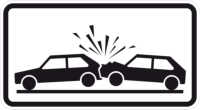
After an Accident
I like people that ask a lot of questions. But not every answer can fit in a FAQ. What follows is general information and is not intended as specific legal advice (please check out my disclaimer).
I’ve Just Been in A Bike or Vehicle Collision. What should I do at the scene? (or What should I have done?)
There are quite a few things you should do at the scene immediately after a collision.
First, call 9-1-1. Just do it. If anyone is injured, you want to get an ambulance en route immediately. But it is also important to get the police involved. Police officers typically take a accident report any time a collision results in physical injury or property damage. Although the police report isn’t usually admissible at trial, it usually contains important contact and insurance information from the parties, witness names and contact numbers, and basic information containing answers to the who, what, when, where, and how. If the police aren’t called, it is critical that you collect this information yourself.
Second, err on the side of caution and let the emergency medical technicians check you out. If you are feeling any discomfort at all, let the ambulance take you to the emergency room. Many people are often in a state of shock following a collision and are not fully aware of how badly they are hurt. Now is not the time to try to “walk it off” or “tough it out.” Be honest with the first responders and let them know if something hurts, feels amiss, or is not quite right.
Third, look around for anyone that witnessed the collision. This can be difficult to do, depending on how badly you are injured. But it is vital that you get the name and phone number of anyone that witnessed the collision. We live in a densely populated area, yet there are rarely any witnesses listed on police accident reports. So if you see someone lingering nearby who might have seen what happened, ask them to jot down their name and a phone number.
Do I need to figure out who’s at fault?
No. There is almost no reason to discuss fault at the scene of the collision. Focus on the facts. Which way were you going? What lane were you in? What was the sequence of events? What color was the light? If you get the facts right, figuring out who is right and who is wrong can be handled later. You don’t need to get an admission from the other driver. An admission at the scene actually means very little, but the facts will matter a lot. When the police show up, tell the officer all of the facts. Don’t worry about proving that you were right and the other guy was wrong. Just focus on the facts.
Should I contact my own insurance company about the collision?
You should contact your insurer if you are in a collision. Your insurance can only protect you or provide coverage if your insurance company knows what happened. Some people are reluctant to make a claim because they fear their rates may increase. If the accident was not your fault, then it is unlikely your rates will go up. If the accident was your fault, you want your insurance company to know about it so that they can provide you with a lawyer to defend you.
Should I give a recorded statement to the insurance company?
If an insurance company asks you for a recorded statement, you should immediately be aware that they only record statements when they intend to use them later. Most likely they are gathering evidence to be used in a possible legal proceeding. If they just need a piece of information, they’ll just ask; they don’t need to record you saying it. Often, they record statements that they intend to use against you. So before giving a recorded statement to an insurance company, you should talk with a lawyer. You might not realize the full implications of the statement you make.
Is it important to take pictures at the scene?
Pictures can be very helpful to document your physical injuries and the damage to your bicycle or car. However, your first priority after a collision should be your health and safety. As I mention above, call 911, let the ambulance take you to the hospital if you are injured, and ask witnesses to the collision to jot down their name and number. Taking pictures at the scene is not a top priority. After your immediate medical needs are taken care of, have a friend or family member help you take pictures of your injuries and property damage to document what happened to you. Pictures are helpful in proving the severity of your injuries, but they are not so important that you need to be snapping photos at the scene of the crash.
